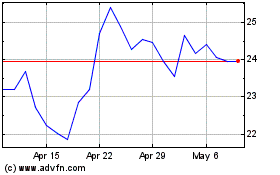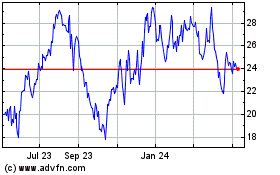2nd UPDATE: Penney Adopts Poison Pill After Activist Incursion
October 18 2010 - 4:20PM
Dow Jones News
J.C. Penney Co. Inc. (JCP) took steps to thwart any shareholder
from gaining control of the century-old retailer without company
consent, 10 days after the surprise incursion of an activist
investor and a landlord.
Penney said Monday that its board of directors instituted a
shareholder rights plan Friday, commonly known as a poison pill, in
response to news earlier this month that William Ackman, founder of
hedge-fund Pershing Square Capital Managment, and Vornado Realty
Trust (VNO), which owns several department-store locations Penney
rents, had both taken significant Penney stakes.
Under the pill, holders of record as of next Monday who hold
less than 10% of the company will receive the right to buy dilutive
preferred stock if a holder hits 10% of the company or if a holder
with 10% or more of the company increases ownership.
Pershing Square reports ownership of 16.5% and Vornado owns 9.9%
of Penney, according to federal filings. Ackman and Vornado have
filed as if they don't constitute a group, but they acquired their
investments in tandem and intend to have discussions with Penney
management and other interested parties.
Ackman didn't reply to email requests for comment, and Vornado
declined to comment. Penney declined to comment beyond the press
release.
J.C. Penney said in a release that it enacted the one-year plan
to "promote fair and equal treatment" of shareholders and "in light
of recent rapid accumulations of the company's outstanding
stock."
Generally, poison pills work by allowing all holders the right
to acquire a large amount of company stock for a
substantially-below-market amount of money, essentially diluting
the holdings of any unwanted pursuer to the point of making such
further acquisitions unpalatable.
Pills can be seen as a coercive tactic by an entrenched board
and management, and activists who try to overrule them--with
varying degrees of success--are sometimes backed by corporate
governance advisory firms. But they can successfully deter
out-sized ownership by someone a company and its shareholders
consider a threat, as with the current, unfolding case of bookstore
chain Barnes & Noble Inc. (BKS) and activist Ronald Burkle's
Yucaipa Cos. If the Penney situation turns hostile, a proxy contest
could ensue where both sides claim the most compelling value
proposition for the storied retailer.
Pershing Square has a mixed record in retail investing, having
bailed on unsuccessful attempts to influence Target Corp. (TGT) and
Barnes & Noble, while continuing to hold a stake in rival
bookseller Borders Group Inc. (BGP) worth much less than Ackman
paid for it. Real estate investment trust Vornado is one of the
largest U.S. owners of offices and malls.
Penney department stores have struggled against Macy's Inc. (M)
and Kohl's Corp. (KSS) in the battle for frugal shoppers--though
Chief Executive Mike Ullman said last month that the retailer
expects to see same-store sales improve in the fourth quarter as
traffic is returning to malls.
J.C. Penney shares are down 1.6% to $33.34.
-By Maxwell Murphy and Karen Talley, Dow Jones Newswires;
212-416-2171; maxwell.murphy@dowjones.com
Kohls (NYSE:KSS)
Historical Stock Chart
From Jun 2024 to Jul 2024

Kohls (NYSE:KSS)
Historical Stock Chart
From Jul 2023 to Jul 2024
